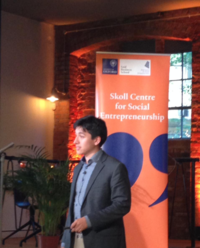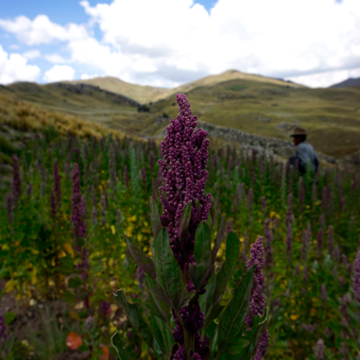An MBA for Social Entrepreneurship
It was 2017 and I was visiting an indigenous Aymara community of quinoa producers. After 3 years of hard work and with some funding from international organizations, these humble smallholder farmers received organic certification that would allow them to earn a fairer price on their quinoa. They put in all the necessary internal audits to prove that the quinoa was organic quality. That year should have been their second organic-certified harvest.

But all was not well.
I had already spoken with the certifier to learn that they missed the required $7,000 payment for certification, and I wanted to know why.
Quinoa prices had plummeted to their lowest levels in years and the grant project supporting the community had ended.
Worse yet, the cooperative had no connections with international clients willing to purchase organic quinoa at a premium price, so their valuable harvest sat in the warehouse for nearly a year.
The farmers couldn’t come up with the money and by the time a buyer came, it was already too late to pay for the next year’s certification. Years of efforts had been wasted, and the farmers were now stuck with poverty-level quinoa prices once again.
How could this tragic situation have been avoided?
An MBA (or any type of higher education) is not a silver bullet for solving problems like these, but it can be a starting point. Business has the power to create wealth, but this wealth often doesn’t reach those who need it most desperately.
As an Oxford educated MBA student with the added privilege of graduating debt-free thanks to the Skoll Scholarship, how should I strive to use business as a force for good? How can I avoid the mistakes of other short-lived projects that have failed to deliver their goals? How can business school skills be of service to smallholder farmers, to ecosystems, to the Earth that we must share?

MBAs teach the core concepts upon which our economic system is built, by extension affecting everyone in society. In some ways, an MBA is geared towards profit maximization, both of MBA alumni and of the corporations they work for. After all, official Financial Times MBA rankings are based partially on the who has the highest salaries 3 years after graduation. With the field of impact investing on the rise, the win-win philosophy of “doing well by doing good” has caught on, affirming that achieving positive social or environmental impact can be profitable.
However, those of us who are committed to a social problem know that impact work often requires sacrifice. As a social entrepreneur the hours are long, the risks are many, and the most significant victories take years to achieve.

As societies face escalating existential threats due to climate change and rising inequality, the MBA programs of tomorrow may look drastically different from those of today. Some of my courses this year have helped me imagine this change and provided me with the language to express it. I’ve learned that there is a difference between avoiding harm and contributing to solutions, that if traditional financing tools don’t meet the needs of social enterprises we can invent new ones, that future business models should be restorative and regenerative by design, and that a major task of business today is to help find a just space for humanity within our planetary boundaries. I’ve also learned the traditional tools of finance, accounting, economics, and strategy which have helped leading business ideas scale and grow.
Although actors from many fields and disciplines must work towards solutions, the role of business is unique because economic activity is the root cause of the most critical environmental problems affecting our world. After all, cleaning up a mess is not as good as preventing it in the first place. This means cutting off or minimizing the flow of pollution and resource depletion from businesses, and some top firms such as IKEA and Unilever are now working to do so.

To prevent catastrophic 2-degree climate change, carbon emissions must sharply and drastically reverse from their long-term steep upward trend. There is no precedent for this and currently there are few signs that this is happening at a sufficient pace. Without cooperation from businesses, the task may be impossible. Social entrepreneurs must also work to build and prove the technologies and business models that will provide the building blocks of this change.
In September I plan to return to Andean farmer communities after a year at Oxford to witness some of the same realities with a new perspective and a new set of resources. I plan to scale my company, Kai Pacha Foods, which I have now realized has a core purpose: to build healthy foods out of healthy ecosystems. By designing food and beverage products based on native crop systems in which each food plays complementary ecological and nutritional roles, we are crafting a business model capable of generating a profit while also improving the livelihoods farmers who conserve land, water, and biodiversity.
After a year packed with so much learning, I have much work ahead to put these concepts and tools into practice. Likewise, the business world and business education have a lot of work ahead to play a more positive role in building an economy that can be sustained on a planet with finite resources.
At Saïd Business School, I have learned about innovation in impact and responsible business alongside the more traditional concepts of an MBA upon which our current economic system is built. From these pieces, the task now falls to us to assemble solutions that are equal to the scale of the problems afflicting our planet.
Alexander Wankel, 2018-19 Skoll Scholar.

Find out more





